Unit 11 How was your school trip? Section B 2b Reading课文知识点串讲课件(共14张PPT)
文档属性
| 名称 | Unit 11 How was your school trip? Section B 2b Reading课文知识点串讲课件(共14张PPT) |
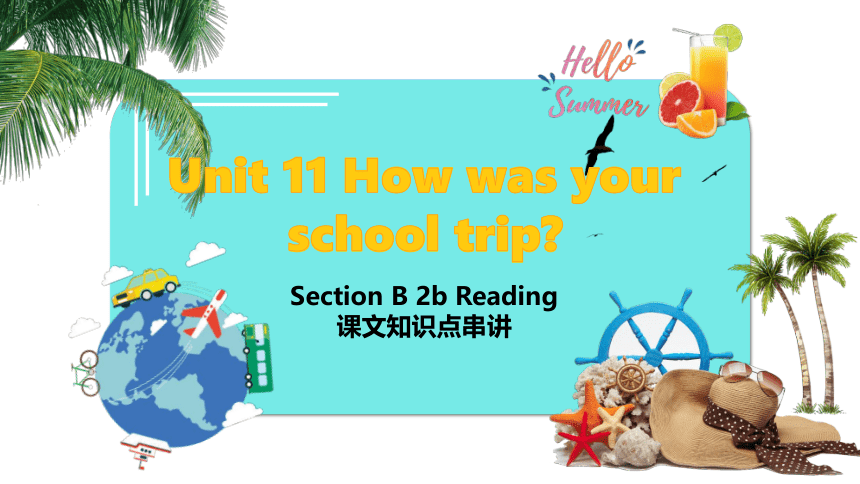
|
|
| 格式 | pptx | ||
| 文件大小 | 2.6MB | ||
| 资源类型 | 教案 | ||
| 版本资源 | 人教新目标(Go for it)版 | ||
| 科目 | 英语 | ||
| 更新时间 | 2022-06-14 00:00:00 | ||
图片预览


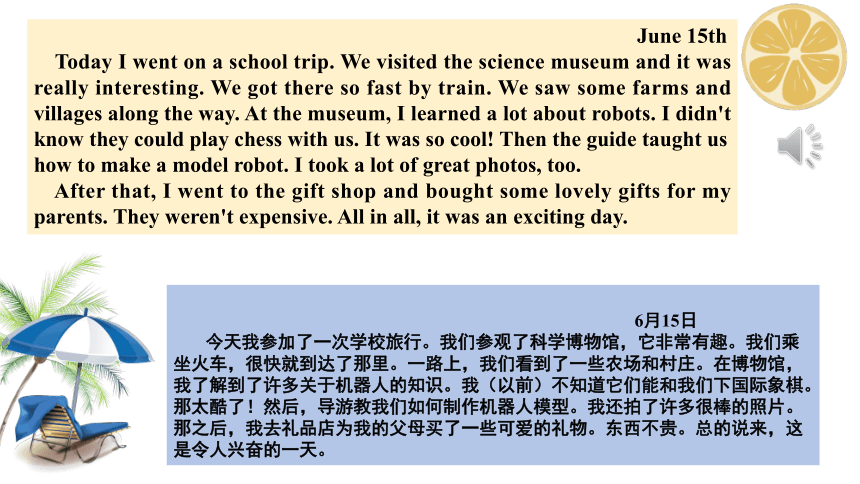
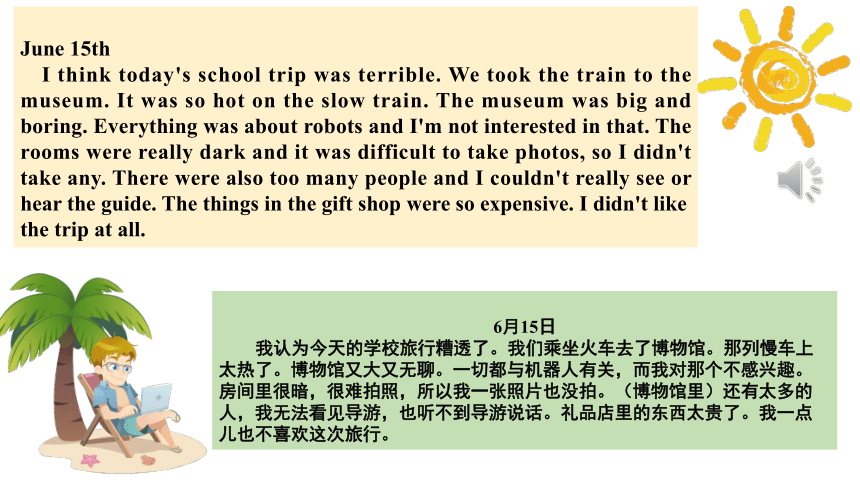
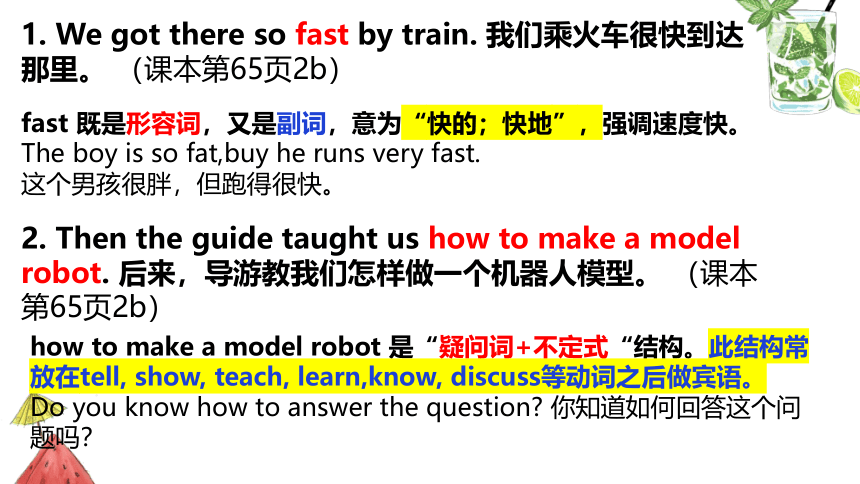
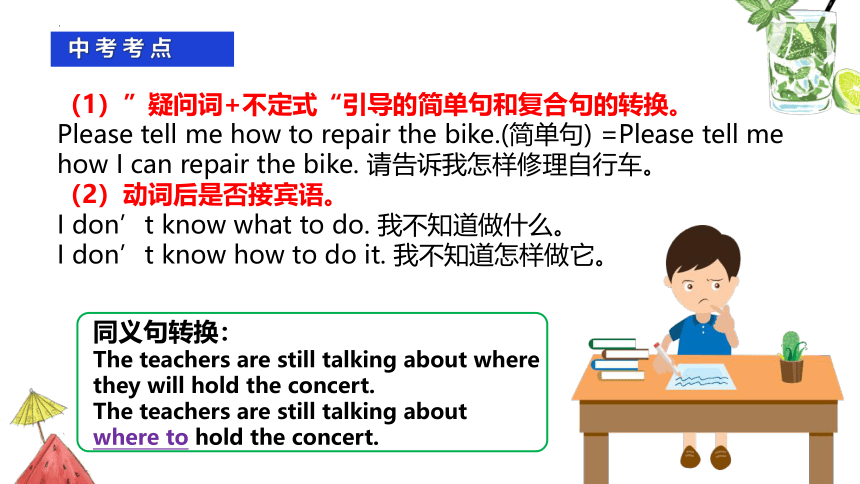
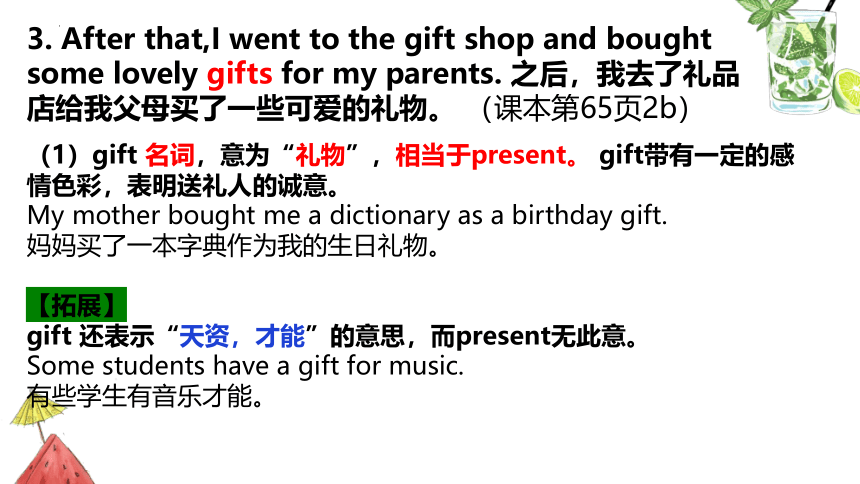
文档简介
(共14张PPT)
Section B 2b Reading 课文知识点串讲
Unit 11 How was your school trip
Reading:
school trip
June 15th
Today I went on a school trip. We visited the science museum and it was really interesting. We got there so fast by train. We saw some farms and villages along the way. At the museum, I learned a lot about robots. I didn't know they could play chess with us. It was so cool! Then the guide taught us how to make a model robot. I took a lot of great photos, too.
After that, I went to the gift shop and bought some lovely gifts for my parents. They weren't expensive. All in all, it was an exciting day.
6月15日
今天我参加了一次学校旅行。我们参观了科学博物馆,它非常有趣。我们乘坐火车,很快就到达了那里。一路上,我们看到了一些农场和村庄。在博物馆,我了解到了许多关于机器人的知识。我(以前)不知道它们能和我们下国际象棋。那太酷了!然后,导游教我们如何制作机器人模型。我还拍了许多很棒的照片。那之后,我去礼品店为我的父母买了一些可爱的礼物。东西不贵。总的说来,这是令人兴奋的一天。
June 15th
I think today's school trip was terrible. We took the train to the museum. It was so hot on the slow train. The museum was big and boring. Everything was about robots and I'm not interested in that. The rooms were really dark and it was difficult to take photos, so I didn't take any. There were also too many people and I couldn't really see or hear the guide. The things in the gift shop were so expensive. I didn't like the trip at all.
6月15日
我认为今天的学校旅行糟透了。我们乘坐火车去了博物馆。那列慢车上太热了。博物馆又大又无聊。一切都与机器人有关,而我对那个不感兴趣。房间里很暗,很难拍照,所以我一张照片也没拍。(博物馆里)还有太多的人,我无法看见导游,也听不到导游说话。礼品店里的东西太贵了。我一点儿也不喜欢这次旅行。
1. We got there so fast by train. 我们乘火车很快到达那里。 (课本第65页2b)
fast 既是形容词,又是副词,意为“快的;快地”,强调速度快。
The boy is so fat,buy he runs very fast.
这个男孩很胖,但跑得很快。
2. Then the guide taught us how to make a model robot. 后来,导游教我们怎样做一个机器人模型。 (课本第65页2b)
how to make a model robot 是“疑问词+不定式“结构。此结构常放在tell, show, teach, learn,know, discuss等动词之后做宾语。
Do you know how to answer the question 你知道如何回答这个问题吗?
(1)”疑问词+不定式“引导的简单句和复合句的转换。
Please tell me how to repair the bike.(简单句) =Please tell me how I can repair the bike. 请告诉我怎样修理自行车。
(2)动词后是否接宾语。
I don’t know what to do. 我不知道做什么。
I don’t know how to do it. 我不知道怎样做它。
中考考点
同义句转换:
The teachers are still talking about where they will hold the concert.
The teachers are still talking about where to hold the concert.
3. After that,I went to the gift shop and bought some lovely gifts for my parents. 之后,我去了礼品店给我父母买了一些可爱的礼物。 (课本第65页2b)
(1)gift 名词,意为“礼物”,相当于present。 gift带有一定的感彩,表明送礼人的诚意。
My mother bought me a dictionary as a birthday gift.
妈妈买了一本字典作为我的生日礼物。
【拓展】
gift 还表示“天资,才能”的意思,而present无此意。
Some students have a gift for music.
有些学生有音乐才能。
(2)buy 动词,意为“买”,反义词sell。 后接双宾语,
即buy sb. sth.=buy sth. for sb. 表示“给某人买某物”。
Mother bought me a pair of jeans. =Mother bought a pair of jeans for me. 妈妈给我买了一条牛仔裤。
【拓展】
当间接宾语放在直接宾语之后,间接宾语要用for或to。
★①动词有物质或信息的传递如giving,bring,show,send,sell,return,lend,throw,tell等词后加介词to。
Can you lend your bike to me 你能把你的自行车借给我吗?
★②动词有服务对象如buy,get,make,find,draw,cook等词后加介词for。
Her mother cooked something delicious for us. 她妈妈给我们做了一些好吃的。
4. They weren’t expensive. 它们不贵。 (课本第65页2b)
expensive 形容词,意为“昂贵的”,相当于dear。反义词为cheap 便宜的。
This is an expensive hat. 这是一顶昂贵的帽子。
It is too expensive for me to buy. 这东西太贵了,我买不起。
【拓展】
表示某物贵或便宜用“物+be+expensive/cheap/inexpensive或The price of+物+be+high/low”,
即物的贵贱一般用expensive/cheap表示,价格的高低常用high/low表示。
The price of this cap is very high. =
The cap is very expensive. 这顶帽子的价格很高。
5. All in all,it was an exciting day. 总的来说,真是令人兴奋的一天。 (课本第65页2b)
all in all 总的来说,常用于文章结尾,用逗号与后面的句子分开,相当于in a word 总之,in short 简言之。
All in all,he is a clever student. 总的来说,他是一个聪明的学生。
(2)exciting 是动词excite “使兴奋”去e加ing变来的形容词,意为“令人激动的,使人兴奋的”。
The news is exciting. 这消息激动人心。
【辨析】 excited, exciting
exciting 令人兴奋的,其主语多为物,作表语或定语。
excited 形容词,兴奋的,主语一般是人。be excited about 对.....感到兴奋。
6. Everything was about robots and I’m not interested in that. 每样东西都是关于机器人的,我对那毫无兴趣。 (课本第65页2b)
be/get/become interested in sth. 意为“对......感兴趣”,后接名词、代词或动词-ing形式。 其主语是表示人的名词。 be interested in=take/have (an)interest in。
He is interested in collecting stamps. 他对集邮感兴趣。
【辨析】 interest,interesting,interested
interest 名词“兴趣”;作动词“使......产生兴趣”。 places of interest 名胜古迹
interesting 形容词“有趣的,令人产生兴趣的”,表示事物的词做主语或interesting作定语。
interested 形容词“对......感兴趣的,对......表现出兴趣的”,指某人对某事物感兴趣,常是人做主语。 be/get/become interested in 对......感兴趣。
7. There were also too many people and I couldn’t really see or hear the guide. 里面有很多人,我真的看不见也听不见导游的解说。 (课本第65页2b)
hear 意为“听见”,表示亲耳听见某事或某人说话。 hear的过去式是heard。
Can you hear me 你能听见我说话吗?
【固定搭配】
★①hear about/of 听说
★②hear from sb. 收到某人的来信
Did you hear about/of the story 你听说过这个故事吗?
I heard from my elder brother last week. 我上周收到了我哥哥的来信。
8. I didn’t like the trip at all. 我一点儿都不喜欢这次旅行。 (课本第65页2b)
not...at all 意为“一点都不;根本不”,表示强烈的否定意味。
【拓展】
not ...at all 用于答语中的三种用法:
(1)应答感谢语,意为“不用谢;不客气”。
——Thank you very much. 非常感谢。
——Not at all. 不用谢。
(2)用于道歉,意为“没关系”。
——I‘m sorry.I’m late. 很抱歉,我迟到了。
——Not at all. Let’s go. 没关系,我们走吧。
(3)用于Would/Do you mind doing sth 的否定回答。
——Would you mind opening the window 你介意打开窗户吗?
——Not at all. 一点也不介意。
Thanks
Section B 2b Reading 课文知识点串讲
Unit 11 How was your school trip
Reading:
school trip
June 15th
Today I went on a school trip. We visited the science museum and it was really interesting. We got there so fast by train. We saw some farms and villages along the way. At the museum, I learned a lot about robots. I didn't know they could play chess with us. It was so cool! Then the guide taught us how to make a model robot. I took a lot of great photos, too.
After that, I went to the gift shop and bought some lovely gifts for my parents. They weren't expensive. All in all, it was an exciting day.
6月15日
今天我参加了一次学校旅行。我们参观了科学博物馆,它非常有趣。我们乘坐火车,很快就到达了那里。一路上,我们看到了一些农场和村庄。在博物馆,我了解到了许多关于机器人的知识。我(以前)不知道它们能和我们下国际象棋。那太酷了!然后,导游教我们如何制作机器人模型。我还拍了许多很棒的照片。那之后,我去礼品店为我的父母买了一些可爱的礼物。东西不贵。总的说来,这是令人兴奋的一天。
June 15th
I think today's school trip was terrible. We took the train to the museum. It was so hot on the slow train. The museum was big and boring. Everything was about robots and I'm not interested in that. The rooms were really dark and it was difficult to take photos, so I didn't take any. There were also too many people and I couldn't really see or hear the guide. The things in the gift shop were so expensive. I didn't like the trip at all.
6月15日
我认为今天的学校旅行糟透了。我们乘坐火车去了博物馆。那列慢车上太热了。博物馆又大又无聊。一切都与机器人有关,而我对那个不感兴趣。房间里很暗,很难拍照,所以我一张照片也没拍。(博物馆里)还有太多的人,我无法看见导游,也听不到导游说话。礼品店里的东西太贵了。我一点儿也不喜欢这次旅行。
1. We got there so fast by train. 我们乘火车很快到达那里。 (课本第65页2b)
fast 既是形容词,又是副词,意为“快的;快地”,强调速度快。
The boy is so fat,buy he runs very fast.
这个男孩很胖,但跑得很快。
2. Then the guide taught us how to make a model robot. 后来,导游教我们怎样做一个机器人模型。 (课本第65页2b)
how to make a model robot 是“疑问词+不定式“结构。此结构常放在tell, show, teach, learn,know, discuss等动词之后做宾语。
Do you know how to answer the question 你知道如何回答这个问题吗?
(1)”疑问词+不定式“引导的简单句和复合句的转换。
Please tell me how to repair the bike.(简单句) =Please tell me how I can repair the bike. 请告诉我怎样修理自行车。
(2)动词后是否接宾语。
I don’t know what to do. 我不知道做什么。
I don’t know how to do it. 我不知道怎样做它。
中考考点
同义句转换:
The teachers are still talking about where they will hold the concert.
The teachers are still talking about where to hold the concert.
3. After that,I went to the gift shop and bought some lovely gifts for my parents. 之后,我去了礼品店给我父母买了一些可爱的礼物。 (课本第65页2b)
(1)gift 名词,意为“礼物”,相当于present。 gift带有一定的感彩,表明送礼人的诚意。
My mother bought me a dictionary as a birthday gift.
妈妈买了一本字典作为我的生日礼物。
【拓展】
gift 还表示“天资,才能”的意思,而present无此意。
Some students have a gift for music.
有些学生有音乐才能。
(2)buy 动词,意为“买”,反义词sell。 后接双宾语,
即buy sb. sth.=buy sth. for sb. 表示“给某人买某物”。
Mother bought me a pair of jeans. =Mother bought a pair of jeans for me. 妈妈给我买了一条牛仔裤。
【拓展】
当间接宾语放在直接宾语之后,间接宾语要用for或to。
★①动词有物质或信息的传递如giving,bring,show,send,sell,return,lend,throw,tell等词后加介词to。
Can you lend your bike to me 你能把你的自行车借给我吗?
★②动词有服务对象如buy,get,make,find,draw,cook等词后加介词for。
Her mother cooked something delicious for us. 她妈妈给我们做了一些好吃的。
4. They weren’t expensive. 它们不贵。 (课本第65页2b)
expensive 形容词,意为“昂贵的”,相当于dear。反义词为cheap 便宜的。
This is an expensive hat. 这是一顶昂贵的帽子。
It is too expensive for me to buy. 这东西太贵了,我买不起。
【拓展】
表示某物贵或便宜用“物+be+expensive/cheap/inexpensive或The price of+物+be+high/low”,
即物的贵贱一般用expensive/cheap表示,价格的高低常用high/low表示。
The price of this cap is very high. =
The cap is very expensive. 这顶帽子的价格很高。
5. All in all,it was an exciting day. 总的来说,真是令人兴奋的一天。 (课本第65页2b)
all in all 总的来说,常用于文章结尾,用逗号与后面的句子分开,相当于in a word 总之,in short 简言之。
All in all,he is a clever student. 总的来说,他是一个聪明的学生。
(2)exciting 是动词excite “使兴奋”去e加ing变来的形容词,意为“令人激动的,使人兴奋的”。
The news is exciting. 这消息激动人心。
【辨析】 excited, exciting
exciting 令人兴奋的,其主语多为物,作表语或定语。
excited 形容词,兴奋的,主语一般是人。be excited about 对.....感到兴奋。
6. Everything was about robots and I’m not interested in that. 每样东西都是关于机器人的,我对那毫无兴趣。 (课本第65页2b)
be/get/become interested in sth. 意为“对......感兴趣”,后接名词、代词或动词-ing形式。 其主语是表示人的名词。 be interested in=take/have (an)interest in。
He is interested in collecting stamps. 他对集邮感兴趣。
【辨析】 interest,interesting,interested
interest 名词“兴趣”;作动词“使......产生兴趣”。 places of interest 名胜古迹
interesting 形容词“有趣的,令人产生兴趣的”,表示事物的词做主语或interesting作定语。
interested 形容词“对......感兴趣的,对......表现出兴趣的”,指某人对某事物感兴趣,常是人做主语。 be/get/become interested in 对......感兴趣。
7. There were also too many people and I couldn’t really see or hear the guide. 里面有很多人,我真的看不见也听不见导游的解说。 (课本第65页2b)
hear 意为“听见”,表示亲耳听见某事或某人说话。 hear的过去式是heard。
Can you hear me 你能听见我说话吗?
【固定搭配】
★①hear about/of 听说
★②hear from sb. 收到某人的来信
Did you hear about/of the story 你听说过这个故事吗?
I heard from my elder brother last week. 我上周收到了我哥哥的来信。
8. I didn’t like the trip at all. 我一点儿都不喜欢这次旅行。 (课本第65页2b)
not...at all 意为“一点都不;根本不”,表示强烈的否定意味。
【拓展】
not ...at all 用于答语中的三种用法:
(1)应答感谢语,意为“不用谢;不客气”。
——Thank you very much. 非常感谢。
——Not at all. 不用谢。
(2)用于道歉,意为“没关系”。
——I‘m sorry.I’m late. 很抱歉,我迟到了。
——Not at all. Let’s go. 没关系,我们走吧。
(3)用于Would/Do you mind doing sth 的否定回答。
——Would you mind opening the window 你介意打开窗户吗?
——Not at all. 一点也不介意。
Thanks
同课章节目录
- Unit 1 Can you play the guitar?
- Section A
- Section B
- Unit 2 What time do you go to school?
- Section A
- Section B
- Unit 3 How do you get to school?
- Section A
- Section B
- Unit 4 Don't eat in class.
- Section A
- Section B
- Unit 5 Why do you like pandas?
- Section A
- Section B
- Unit 6 I'm watching TV.
- Section A
- Section B
- Review of Units 1-6
- Unit 7 It's raining!
- Section A
- Section B
- Unit 8 Is there a post office near here?
- Section A
- Section B
- Unit 9 What does he look like?
- Section A
- Section B
- Unit 10 I'd like some noodles.
- Section A
- Section B
- Unit 11 How was your school trip?
- Section A
- Section B
- Unit 12 What did you do last weekend?
- Section A
- Section B
